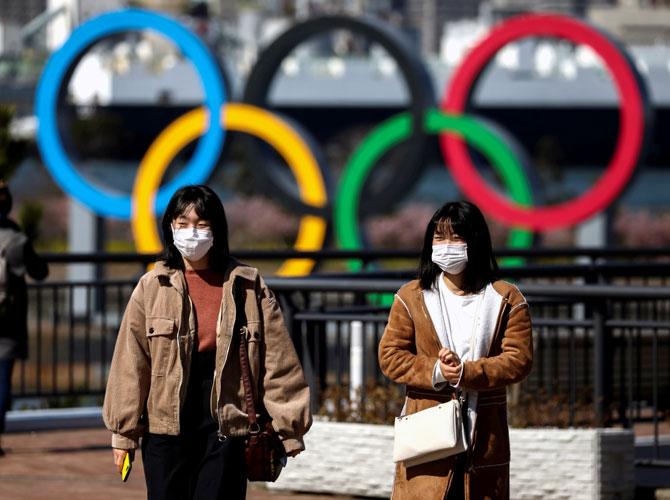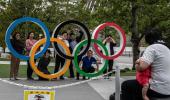
Japan said on Thursday it was not currently looking to prioritise COVID-19 vaccines for Olympic athletes, dismissing a media report that sparked a social media outcry since the country's inoculations are trailing other major economies.
Only a million people have received the first dose of the Pfizer vaccine since February, out of Japan's population of 126 million, and the more vulnerable elderly do not even start getting their shots until next week.
New infections have spiked ahead of the Olympics, which are set to start in July. Tokyo saw 545 new cases on Thursday and its governor said she would ask the central government to impose emergency measures in the capital region.
A Kyodo news agency report, citing government officials, said Japan has begun looking into the possibility of ensuring its Olympic and Paralympic athletes are all vaccinated by the end of June.
'Give it to my mother first,' one Twitter user wrote, adding: 'Athletes are all young and healthy.'
While the government has said it will push ahead with the Olympics as planned from July 23, a vast majority of Japanese want the Games to be cancelled or postponed again.
The outrage on social media continued despite Chief Cabinet Secretary Katsunobu Kato denying the report and saying that the government was not looking to give priority to athletes.
"This is really weird. Given that we have no idea if even all the elderly will have received their vaccines by mid-June, you're going to have all the athletes have theirs?" a user with the handle "Aoiumi2" posted on Twitter.
Others noted that Japan's original plan gives priority to medical workers, the elderly and those with chronic conditions, with ordinary citizens unlikely to get theirs before the summer.
A number of test events for some sports have recently been cancelled or postponed due to concerns about the pandemic, and on Tuesday leading business executive Hiroshi Mikitani wrote on Twitter that holding the Games was 'risky'.
"Honestly, I feel that the Olympics this summer are just far too risky. I am against them," wrote Mikitani, the CEO of Japanese e-commerce group Rakuten Inc.
Even so, much of corporate Japan is still mobilized behind the Olympics. Atsushi Katsuki, the CEO of Asahi Group, said he stood by holding the Games and that the leading beer maker had benefited from being a sponsor.
"I want the Olympics and Paralympic Games to be held," Katsuki said in an interview with Reuters.
"It's unfortunate that the Olympics have been scaled down, but we're not too concerned about that," he added.
Japan Olympic adviser urges COVID-19 vaccine option for athletes
A health adviser to Japan's Olympic committee said on Tuesday athletes should have the option of getting COVID-19 vaccines, days after public outcry led the government to deny it was making them a priority.
Japan on Thursday had dismissed a media report that it was considering vaccinating all its Olympians by the end of June after the idea sparked a social media uproar amid a slow vaccine rollout for the rest of the population.
But on Tuesday, the adviser, Nobuhiko Okabe, told Reuters that although vaccines should not be an obligation, they should be available to the athletes who want them. Okabe is an infectious disease expert who helped guide Japan's response to the H1N1 outbreak in 2009 and advises on its COVID-19 response.
"I think the recommendation should be to be immunized, particularly for the athletes," said Okabe, who has held leadership roles in the World Health Organisation.
He said choices by individual athletes to refuse the vaccine for health or religious reasons "should be respected."
About 1.1 million health care workers in Japan have received at least their first dose of Pfizer Inc-BioNTech's vaccine.
Inoculations of the country's sizable elderly population began on Monday, but some experts caution that shots for the general populace may not be available until late summer or even winter because of constrained supplies.
Okabe, who heads the Kawasaki City Institute for Public Health, also said Japan's commercialisation and licensing hurdles involving drugs and medical products remain a "big problem," as they could slow its response to health crisis such as pandemics.
Japan has approved only one COVID-19 vaccine so far and about 0.9% of its population of 126 million has gotten at least one dose of COVID-19 vaccine, compared with 2.2% in South Korea or 36% in the United States, according to a Reuters tracker.













 © 2025
© 2025